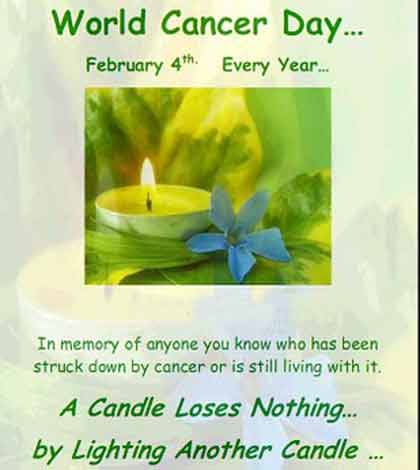“The most important thing in illness is never to lose heart.” – Nikolai Lenin
With World Cancer Day observed each year on February 4th, I thought of sharing the main cancer causes & prevention’s that you and your family can follow to keep this dreaded disease away. Currently, 1 in 4 deaths in the US is due to cancer with lung cancer as the most common cause of cancer-related death in most families. The most common cancers in women in the United States are breast cancer, lung cancer, and colon cancer, and common cancers in men are prostate cancer, lung cancer, and colon cancer.
Let’s start by understanding more about the various causes of cancer & its prevention.
- What is Cancer?
The cells in the human body are made up of infinite cells, which usually multiply in an organized manner. They multiply when the body needs them, and die when the body does not need them. Cancer occurs when the growth of cells in the body goes out of control and the cell division takes place too quickly, or when the cells ‘forget’ how to die. In short, cancer is the uncontrolled growth of abnormal cells in the body, and these cancerous cells are also known as malignant cells.
- What are the main causes of cancer?
With more than 100 various types of cancer, each classified by the type of cell that is initially affected, cancer can develop in any organ or tissue like the breast, skin, lung, colon, nerve tissues, or the bones. The main cancer causes are:
· Low intake of vegetables and fruits.
· Air and water pollution due to chemicals like Benzene, heavy metals, toxic gases or arsenic.
· Excessive sunlight and exposure to UV rays and ionic radiation.
· Unsafe sexual practice.
· Excessive use of alcohol and tobacco.
· Being obese or over weight.
· Genetic problems.
· Physical inactivity.
· Viruses or viral infections due to Hepatitis B, HIV, or HPV.
- What are the signs and symptoms of cancer?
Cancer symptoms depend upon the location and type of cancer. For example, colon cancer often causes constipation, diarrhea, and blood in the stool, while lung cancer gives rise to chest pain, coughing, or shortness of breath. The following symptoms may occur in most cancers:
· Sores that do not heal.
· Blood in stool, urine, and cough.
·Noticeable changes in a mole or wart.
·Any kind of persistent swelling or lump in the body.
·Difficulty in swallowing or persistent indigestion.
·Change in voice and chronic cough.
·Change in bladder and bowel habits.
·Unexplained weight loss and loss of appetite.
·Fever, fatigue, chills, anemia, excessive sweating are a few other symptoms.
- How can you detect and treat cancer?
Cancer can be detected by using imaging techniques like CT scans, X-rays, PET scans, MRI scans, and ultrasound scans. Cancer treatment depends upon the age, health status, type and stage of cancer and is done via radiation, chemotherapy, surgery, immunotherapy, gene therapy, or hormone therapy.
- How can you prevent cancer?
Getting cancer screenings like colonoscopy for colon cancer, or mammography for breast cancer may help catch these cancers at their initial stages, when most cancers are treatable. You and your family can lessen the risk of getting a cancerous tumor by take these preventive measures:
·Maintain a healthy weight.
·Eat a healthy and nutritious diet that includes fruits, vegetables, and high fibre.
·Limit the intake of alcohol.
·Exercise regularly.
·Avoid chewing tobacco and do not smoke.
·Reduce you exposure to direct sunlight or use sunscreen, hats, and use protective clothing.
·Control occupational hazards.
·Get vaccinated against HPV, HBV.
One of the most inspirational person who continued to overcome the battles of cancer, Lance Armstrong, an American professional road racing cyclist who won the Tour de France a record seven consecutive times, after having survived testicular cancer.
He said, “If children have the ability to ignore all odds and percentages, then maybe we can all learn from them. When you think about it, what other choice is there but to hope? We have two options, medically and emotionally: give up or fight like hell.” Lance Armstrong obviously didn’t give up, and fought with vigor and unstoppable belief in his recovery.
Remember to take care of your family and yourself by getting regular health checks and cancer screening done, and if you are diagnosed, take proper and complete treatment. Keep your spirits high, as there are many people who have survived fighting cancer, and so can you!
Disclaimer: We're not offering any medical advice here. These ideas are for educational and entertainment purposes only. Always seek a professional medical opinion from a physician of your choosing before making any medical decision. The information provided here is not intended to be a substitute to the advice given by your physician or another healthcare professional.
